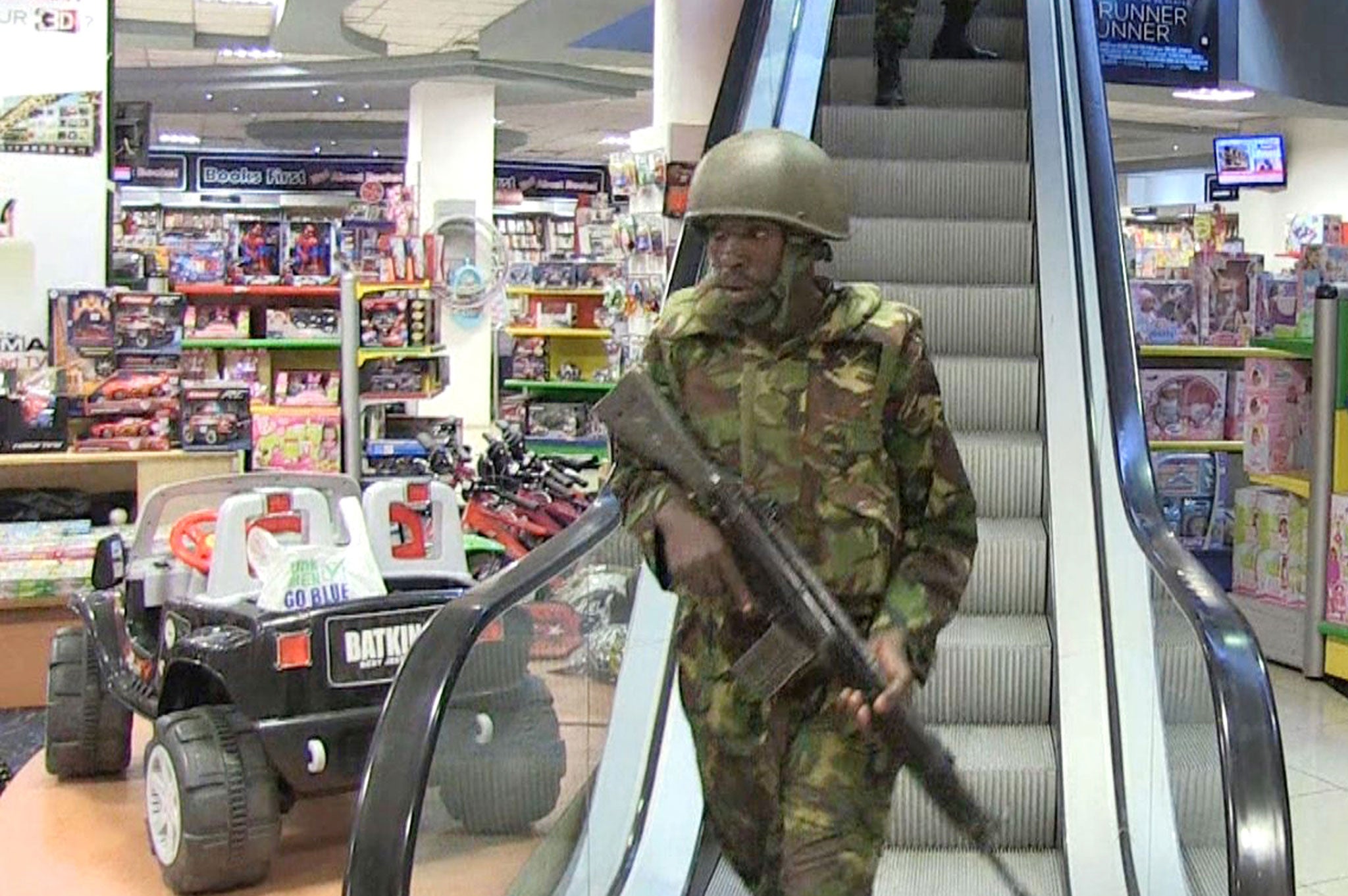Kenya shopping mall attack: The West must act judiciously over Somalia if these horrors are to end
Somalia’s problems have been worsened by bungled intervention from outside


Your support helps us to tell the story
From reproductive rights to climate change to Big Tech, The Independent is on the ground when the story is developing. Whether it's investigating the financials of Elon Musk's pro-Trump PAC or producing our latest documentary, 'The A Word', which shines a light on the American women fighting for reproductive rights, we know how important it is to parse out the facts from the messaging.
At such a critical moment in US history, we need reporters on the ground. Your donation allows us to keep sending journalists to speak to both sides of the story.
The Independent is trusted by Americans across the entire political spectrum. And unlike many other quality news outlets, we choose not to lock Americans out of our reporting and analysis with paywalls. We believe quality journalism should be available to everyone, paid for by those who can afford it.
Your support makes all the difference.For two years, Kenyans have been bracing themselves for the barbarism we have just witnessed in Nairobi. Ever since their army invaded neighbouring Somalia following the killing and kidnapping of aid workers and tourists on their terrain, people have worried about the near-inevitable carnage to come their way. There were attacks on churches, small-scale bombings. But many suspected the ultimate target was Westgate, with its wealthy shoppers from the newly rich elites and armies of expats. Now their worst fears have been realised.
The details that have emerged are chilling: people out shopping on a Saturday morning lined up, given a religious test and shot dead if they failed. Most were Kenyan, of course, but families from at least 13 nations from China to Peru are united in grief with this shocked nation. Among the British victims was an architect who had designed a clinic for HIV patients in Kenya free of charge, and his heavily pregnant wife, a malaria specialist working for the Gates Foundation. Good people, slaughtered by gun-toting gangsters.
Now the heat will be turned on al-Shabaab, the Somali-based group responsible for the savagery. Already you can hear talk on the radio blurring them with al-Qa’ida. There will be hot-head calls for reprisals, angry demands to step up the Western-backed war on terror already being ramped up so alarmingly in the Horn of Africa. We must hope cool heads prevail. For while the actions of the terrorists are indefensible, we have to understand why so much innocent blood has been spilled inside a shopping mall.
Somalia is seen as the ultimate failed state, an ungovernable hellhole plagued with poverty, conflict and hatred. Curiously, it is one of only two African nations sharing a single language, religion and culture; the other is Botswana, one of the continent’s biggest success stories. Yet it is riven with historic rivalries between hundreds of nomadic clans and sub-clans. The last person to rule with any real authority was a military dictator, Siad Barre, whose overthrow in 1991 sparked the chaos that still engulfs the country.
One million Somalis have been killed since then, twice that number displaced and much of the country reduced to rubble. Half a million Somali exiles now live in Kenya, where even before this vicious attack they faced growing hostility. But while many of the country’s problems were self-induced, with feuding warlords growing rich as they ripped apart their own country, Somalia’s problems were worsened by bungled interventions from outside.
Go back eight years, and a semblance of normality had returned to the country. Western-backed warlords had been defeated and the Union of Islamic Courts, a coalition of Islamic conservatives, enforced the rule of law. There was security in Mogadishu, with families knowing a son or daughter would return from a trip to the shops rather than end up bleeding in the streets; unsurprisingly, the courts were popular, despite often intolerant rulings. The possibility of genuine peace hovered on the horizon.
But a united, stable and Islamic country was the last thing Ethiopia wanted on its doorstep. So it invaded in the name of driving out fundamentalism, persuading Britain and the United States to back their key ally in the region. The incursion was disastrous, with Somalia spiralling back out of control, while grotesque human rights abuses boosted the militant cause. The biggest beneficiary was the security wing of the courts movement, al-Shabaab, which soon had control of much of Mogadishu and great swathes of the country.
The increasingly hardline group won headlines by murdering Westerners, stoning adulterers, banning bras and yanking gold teeth out of people’s mouths. While publicly condemning criminality, they raked off millions from maritime kidnapping and the lucrative illegal charcoal trade. But when cross-border raids by criminal gangs into Kenya became too much, culminating in the midnight murder of British publishing executive David Tebbutt at a beach cottage, Kenya claimed little choice but to send 2,000 troops over the border. The recent narrative has been one of normalisation. There have been stories about the stuttering rebirth of a shattered state, of refugees returning to rebuild their nation, of al-Shabaab riven by divisions and on the run. Britain has played a leading role, knocking heads together and pouring in aid (although, as in Afghanistan, huge sums vanished into the pockets of some very dubious characters.) Unfortunately, the optimism and talk of a “new era” has been overdone.
The shopping mall slayings show al-Shabaab remains a lethal force, one that in classic insurgency style melted out of sight in major cities while regrouping under a new hardline leader. It was significant the hardy souls at Medecins Sans Frontiers quit Somalia last month after 22 years due to “extreme attacks”.
Yet we should not be deluded by cheap comparisons with al-Qa’ida. Yes, the terrorists are Islamic militants, as shown by their sparing of Muslims in Nairobi, and last year they pledged allegiance to al-Qa’ida. But this murderous group is primarily a nationalist response to repeated interference in Somalia, muddled up in the mind-boggling complexity of clan rivalry - although if reports the attackers came from all over the world are confirmed, it underlines the dangerously-combustible nature of the Somali crisis and urgent need for resolution.
Their very emergence was to some extent down to outside interference. Traditional Somali Sufism was usurped by a more hardline Wahabi creed spread by the Saudi money which has proved so corrosive around the globe. More recently, the latest invading army stands accused of human rights abuses while the UN says Kenyan officers aided the export of illegal charcoal that earns millions for militias. And once again, the West has backed some clans and warlords over others.
Meanwhile Somali fears that Kenya and Ethiopia want to carve up their country were strengthened last month with the signing of a deal recognising Jubaland, a strip of land on their borders, as another independent entity like Puntland, Galmudug and Somaliland. Its leader has been denounced by the UN and linked to al-Shabaab, yet the deal was widely welcomed – not least by Jubaland’s neighbours, who now have a nice new buffer state.
Yet it is Somaliland that shows the clearest path to peace in this turbulent corner of the world. It was destroyed in the 1991 civil war yet has emerged as one of the most inspirational stories of rising Africa with a functioning democracy, fierce self-determination and comparatively free expression. The reason is simple: it was not recognised by the outside world when it declared independence. This meant no outside intervention, little aid and the clan elders were left to negotiate their own way forward. This breakaway republic – a former British protectorate – offers cause for hope in the most unlikely circumstances. The world must do all it can to ensure the bloodshed just witnessed in a shopping mall is never repeated by aiding the re-creation of a functioning Somali state. But equally, the lesson from history is that outsiders must tread warily if they are not to make matters worse – and however unpalatable, embrace all parties in any solution.
Join our commenting forum
Join thought-provoking conversations, follow other Independent readers and see their replies
Comments